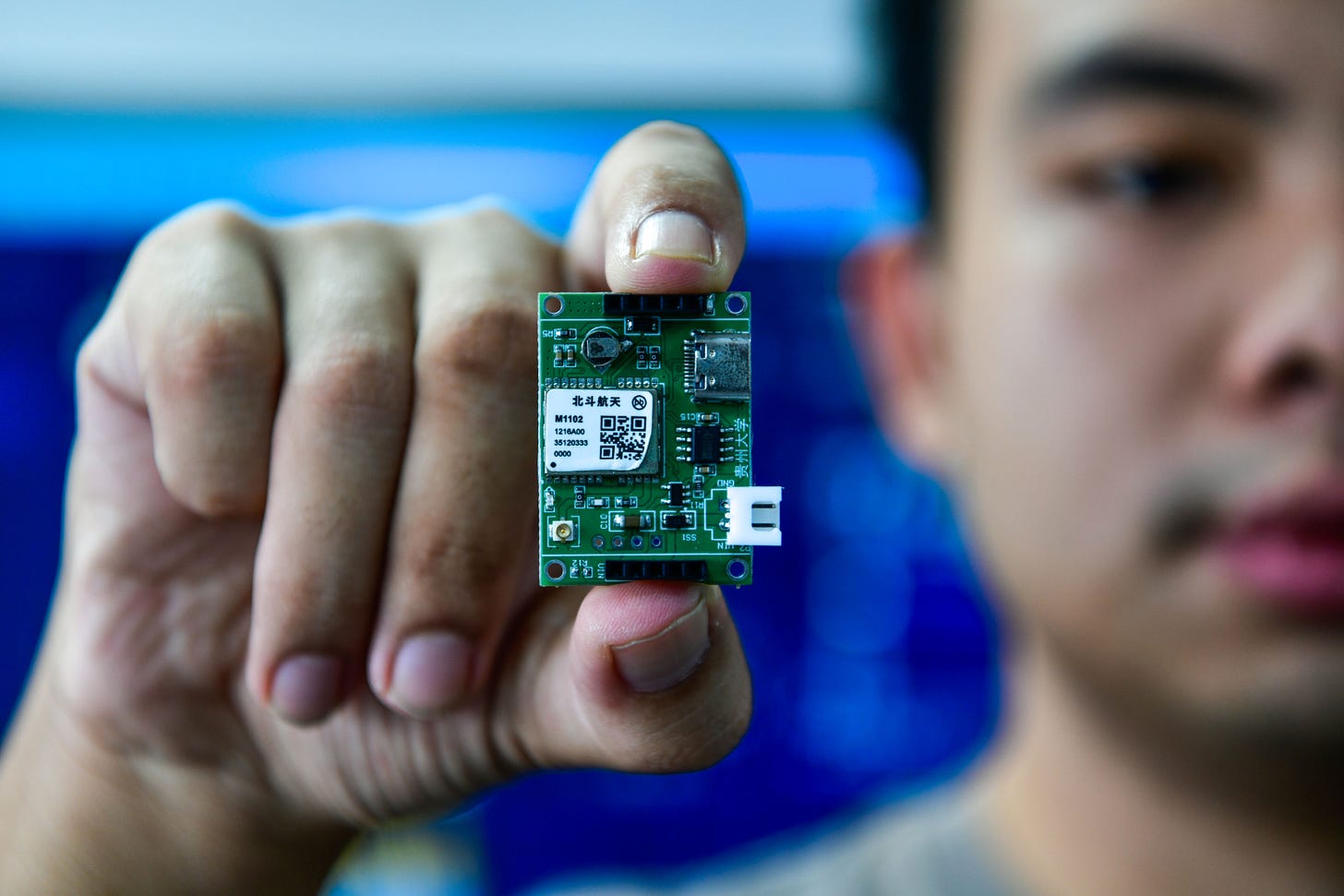Must-Read China Economic News (Oct. 26-Nov. 1)
PMI, Trade in Goods and Services, New Liquidity Tool, China-EU Relations
Greetings and welcome to the latest edition of Peking Ensight! We're thrilled to have you join us once again as we navigate the ever-evolving landscape of the Chinese economy.
⭐Under the Spotlight
KEY MACROECONOMIC INDICATORS:
1. PMI
China's manufacturing sector returned to expansion in October after five consecutive months of contraction as the government policy support boosted business activity and bolstered market confidence.
The purchasing managers' index (PMI) for China's manufacturing sector came in at 50.1 in October, up from 49.8 in September and surpassing the boom-or-bust line of 50 for the first time since May, according to a statement of the National Bureau of Statistics (NBS).
Data showed manufacturing activity this month registered faster growth, with key sectors such as basic raw materials, equipment manufacturing, high-tech manufacturing and consumer goods continuing their stable and positive performance.
Notably, the general equipment, automotive and electrical machinery industries reported rapid expansion, with their production and new order sub-indices above 54.
The business expectation index also rose to a four-month high of 54 in October, reflecting growing confidence among manufacturers.
Wen Tao, an analyst at the China Logistics Information Center, said that as the manufacturing PMI in October often fell below that of September in past years, this October's rising figure highlighted the effectiveness of the recent government policies.
2. Industrial Profits
The combined profit of major industrial enterprises in China reached 5.23 trillion yuan (735.41 billion U.S. dollars) in the January-September period, down 3.5 percent year on year, the NBS said.
Meanwhile, the new momentum industries represented by high-tech manufacturing experienced rapid growth. NBS statistician Yu Weining said this showcases the resilience of industrial economic development.
Multiple factors have contributed to the decline in industrial enterprises' profit growth rates, including a significant increase in the year-on-year comparison base since August, insufficient effective demand, and declining industrial product prices, said Yu.
In September alone, profits dropped by 27.1 percent year on year.
According to the NBS, the total profits of major industrial enterprises increased by 575.43 billion yuan from January to September compared to the period from January to August.
During the first nine months, driven by rapid production growth, the profits of high-tech manufacturing industries increased by 6.3 percent year on year.
3. Trade in Goods, Services
The value of China's international trade in goods and services reached approximately 4.48 trillion yuan in September, marking an increase of 5 percent year on year, official data showed.
In U.S. dollar terms, the country's exports and imports of goods and services amounted to 352 billion U.S. dollars and 280.6 billion dollars, respectively, recording a surplus of 71.3 billion dollars, the State Administration of Foreign Exchange said.
The export value of goods reached nearly 2.25 trillion yuan, while the import value of goods totaled 1.62 trillion yuan, resulting in a surplus of 626.8 billion yuan.
The value of exported services amounted to 242 billion yuan and the value of imported services stood at 364 billion yuan, producing a deficit of 121.9 billion yuan.
NEW LIQUIDITY TOOL
China's central bank has incorporated outright reverse repos on Oct. 28, a new liquidity tool, into its monetary policy toolbox to keep liquidity reasonable and ample in the country's banking system.
The People's Bank of China (PBOC) will use outright reverse repos to trade with primary dealers in open market operations, the bank said in a statement on its website, adding that outright reverse repos will be carried out once a month, with a tenor of no more than one year.
The new tool is regarded as a further enrichment of the country's monetary policy toolkit following the introduction of temporary repos, temporary reverse repos, and the buying and selling of treasury bonds.
The PBOC's liquidity toolkit mainly includes seven-day reverse repos and a one-year medium-term lending facility (MLF), as well as treasury bond purchases and reserve requirement ratio (RRR) cuts for injecting long-term liquidity.
On Oct. 31, China's central bank announced that it has conducted "outright reverse repo" operations, the first of its kind since the monetary policy tool was introduced earlier.
In a statement, the PBOC said it carried out the operations in the amount of 500 billion yuan through a variable-rate tender with a fixed quantity and multi-price auction, with a tenor of six months.
BILATERAL RELATIONS
China-EU Tariff Beef
China does not approve of or accept the European Commission's decision to impose extra tariffs on China-made electric vehicles (EVs), a spokesperson with the Ministry of Commerce said.
China has repeatedly pointed out that the EU's anti-subsidy investigation into Chinese EVs is irrational, fraught with numerous non-compliance issues, and is a protectionist move under the guise of "fair competition," said the spokesperson in a statement released on the ministry's website.
China has already appealed to the WTO's dispute settlement mechanism over the issue, and will continue to take all necessary measures to safeguard the legitimate rights and interests of Chinese enterprises.
Noting that the EU is still willing to continue talks on price commitments for Chinese-made EVs, the spokesperson said China always advocates the resolution of trade disputes through dialogue and consultation, and had made the utmost efforts to this end.
Currently, technical teams from both sides are engaged in a new phase of consultations.
It is hoped that the European side will work constructively with China, following the principles of "pragmatism and balance" and taking into account each other's core concerns, and strive to reach a mutually acceptable solution as soon as possible to avoid an escalation of trade frictions, according to the spokesperson.
Widespread Opposition
The European Union's (EU) decision to impose definitive countervailing duties on Chinese-made electric vehicles (EVs) for a period of five years has sparked strong opposition, with China calling the move "unfair, unreasonable and unobjective."
In a statement on Oct. 30, the China Chamber of Commerce for Import and Export of Machinery and Electronic Products (CCCME), on behalf of the Chinese automotive industry, expressed "great regret" over the decision to impose anti-subsidy tariffs on electric vehicles originating in China.
Starting Oct. 30, these tariffs will apply with varying rates for different companies: 17 percent for BYD, 18.8 percent for Geely, and 35.3 percent for SAIC. Other cooperating firms will be subject to a 20.7 percent duty, while non-cooperating companies will have a duty rate of 35.3 percent, according to the European Commission.
Following a substantiated request for an individual review, U.S. EV maker Tesla, which also manufactures vehicles in China, will face a duty of 7.8 percent, the commission noted.
The CCCME said the European Commission failed to rectify its "incorrect findings" in the final ruling on the imposition of definitive duties against Chinese EVs, and there was a serious lack of transparency in the procedure, adding that the move seriously violates relevant World Trade Organization (WTO) and EU anti-subsidy rules.
The China Association of Automobile Manufacturers (CAAM) also expressed disagreement with the decision in a statement on Oct. 30. The decision, which is not objective and extremely unfair to China's auto companies, is deemed unacceptable, the CAAM said.
The CAAM stressed that the imposition of tariffs not only violates the fundamental principles of free trade and fair competition, but also undermines cooperation between the Chinese and European automotive industries, as well as green and low-carbon transition.
Opposing U.S. Investment Restrictions
China strongly opposes the U.S. final regulations on investment restrictions aimed at China, a spokesperson with the Ministry of Commerce said.
China has lodged solemn representations with the United States and reserves the right to take action, said the spokesperson in a statement published on the ministry's website.
The United States has overstretched the concept of national security to adopt discriminatory investment restrictive measures against China, which is a typical non-market practice, the spokesperson said.
The spokesperson noted that the U.S. restrictions target sectors like chips, AI and quantum computing. Most industries related to these fields are not connected to national security, yet they will all be affected by the U.S. ban.
This will disrupt normal economic and trade cooperation between Chinese and U.S. companies, harming the interests of businesses in both countries, the spokesperson said.
China has noticed that many U.S. business associations and companies have expressed concerns that U.S. investment restrictions against China will cause American companies to give up the Chinese market to competitors from other countries, severely damaging U.S. interests, the spokesperson stated.
It is hoped that the United States will respect market economy laws, properly define the boundaries of national security in economic and trade fields, and stop politicizing and weaponizing economic and trade issues, the spokesperson added.














